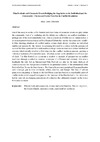Please use this identifier to cite or link to this item:
https://accedacris.ulpgc.es/jspui/handle/10553/56392
| DC Field | Value | Language |
|---|---|---|
| dc.contributor.author | Costa-Villaverde, Elisa | en_US |
| dc.date.accessioned | 2019-08-28T12:40:59Z | - |
| dc.date.available | 2019-08-28T12:40:59Z | - |
| dc.date.issued | 2016 | en_US |
| dc.identifier.issn | 2187-0667 | en_US |
| dc.identifier.uri | https://accedacris.ulpgc.es/handle/10553/56392 | - |
| dc.description.abstract | Out of the many roles that a film festival and other forms of cinematic events can play within the community, that of a mediating site for debate and reflection on conflict resolution is perhaps one of the most remarkable ones. Film as a medium of reflection on human nature is at its most potent when accompanied by a forum of debate that reaches the community broadly. A film showing situations of conflict and/or culture clash always involves an individual intellectual exercise for the viewer. A screening followed by a debate with the presence of some of the film agents and with wide media coverage means an even more intense intellectual exercise which usually involves a first step into the conflict resolution process: growing a collective awareness of the need for social reflection, as well as the identification of the causes of clash. The film festival can constitute a window to myriads of perspectives on conflict resolution through a collective exercise in analysis of difference and diversity. This article highlights the role that an International Film Festival can play in the inner dialogue of communities and for that purpose it refers to the particular context of the International Film Festival of Las Palmas de Gran Canaria. The Canary Islands are a peripheral European frontier and a strategic gate to three continents: Africa, America, and Europe. The flow of African populations migrating to Europe in the last fifteen years has become a considerable point of conflict in the social map of the region and the presence of the film festival in the islands has had its own role in changing perceptions of a situation that ultimately impacts on the whole European continent. | en_US |
| dc.language | eng | en_US |
| dc.relation.ispartof | IAFOR journal of media, communication & film | en_US |
| dc.source | IAFOR journal of media, communication & film [ISSN 2187-0667], v. 3 (1), p. 63-76 | en_US |
| dc.subject | 620301 Cinematografía | en_US |
| dc.subject.other | Film festivals and community | en_US |
| dc.subject.other | Cinema and social function | en_US |
| dc.subject.other | Film and migration | en_US |
| dc.subject.other | Canary Islands | en_US |
| dc.subject.other | Cinematic events | en_US |
| dc.subject.other | Social conflict resolution | en_US |
| dc.title | Film festivals and cinematic events bridging the gap between the Individual and the community: cinema and social function in conflict resolution | en_US |
| dc.type | info:eu-repo/semantics/article | en_US |
| dc.type | Article | en_US |
| dc.identifier.doi | 10.22492/ijmcf.3.1 | en_US |
| dc.investigacion | Artes y Humanidades | en_US |
| dc.type2 | Artículo | en_US |
| dc.identifier.ulpgc | Sí | es |
| item.grantfulltext | open | - |
| item.fulltext | Con texto completo | - |
| crisitem.author.orcid | 0000-0002-9065-9583 | - |
| crisitem.author.fullName | Costa Villaverde, Elisa Isabel | - |
| Appears in Collections: | Artículos | |
Page view(s) 10
80
checked on Jan 11, 2026
Download(s)
103
checked on Jan 11, 2026
Google ScholarTM
Check
Altmetric
Share
Export metadata
Items in accedaCRIS are protected by copyright, with all rights reserved, unless otherwise indicated.
